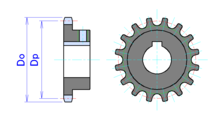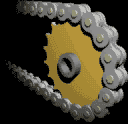

A sprocket,[1] sprocket-wheel[2] or chainwheel is a profiled wheel with teeth that mesh with a chain, rack or other perforated or indented material.[3][4] The name 'sprocket' applies generally to any wheel upon which radial projections engage a chain passing over it. It is distinguished from a gear in that sprockets are never meshed together directly, and differs from a pulley in that sprockets have teeth and pulleys are smooth except for timing pulleys used with toothed belts.
Sprockets are used in bicycles, motorcycles, tracked vehicles, and other machinery either to transmit rotary motion between two shafts where gears are unsuitable or to impart linear motion to a track, tape etc. Perhaps the most common form of sprocket may be found in the bicycle, in which the pedal shaft carries a large sprocket-wheel, which drives a chain, which, in turn, drives a small sprocket on the axle of the rear wheel. Early automobiles were also largely driven by sprocket and chain mechanism, a practice largely copied from bicycles.
Sprockets are of various designs, a maximum of efficiency being claimed for each by its originator. Sprockets typically do not have a flange. Some sprockets used with timing belts have flanges to keep the timing belt centered. Sprockets and chains are also used for power transmission from one shaft to another where slippage is not admissible, sprocket chains being used instead of belts or ropes and sprocket-wheels instead of pulleys. They can be run at high speed and some forms of chain are so constructed as to be noiseless even at high speed.
- ^ "Sprocket - Definition". Merriam-Webster. Retrieved 2011-11-14.
sprocket, n. 1: a toothed wheel whose teeth engage the links of a chain
- ^ Oxford English Dictionary (2nd ed.). Oxford University Press. 1989.
sprocket, n. 2. b. ellipt. A sprocket-wheel, esp. that of a cycle; and (Cinematogr.), one that propels film by engaging with perforations along its edge.
- ^ The Encyclopedia Americana: a library of universal knowledge, sprocket. pg 460
- ^ Elements of machine design By Oscar Adolph Leutwiler